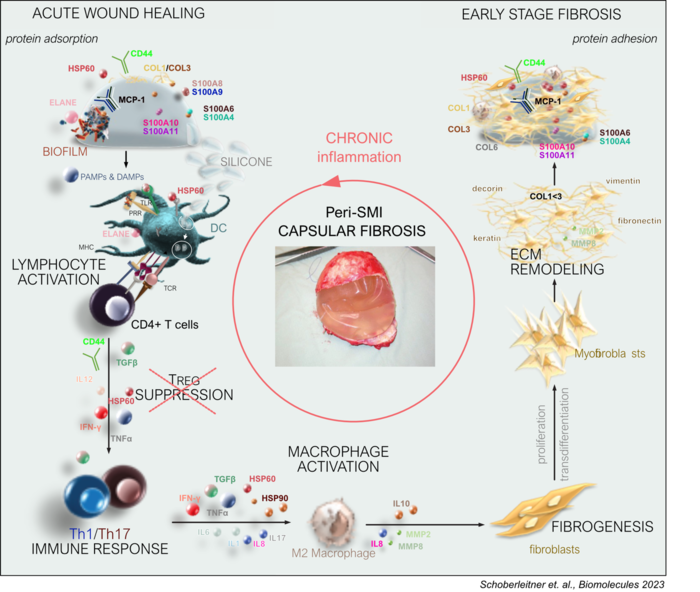Universitätsklinik für Plastische,
Rekonstruktive und Ästhetische Chirurgie
Department Operative Medizin
Home > Forschung > Forschungslabor > Immunologie in Plast. Chir. (AG_Wolfram)
Immunologie in Plast. Chir. (AG_Wolfram)
"Immuno-Reaktivität und - Biokompatibilität von Silikonbrustimplantaten in der ästhetischen und rekonstruktiven Brustchirurgie"
Dolores Wolfram (PI), Ines Schoberleitner (Postdoc)
Hintergrund
Silikon-Brustimplantate (SMI) werden seit den 1960er Jahren für rekonstruktive und ästhetische Indikationen verwendet. Die Kapselkontraktur, eine durch Fremdkörper induzierte fibrotische Erkrankung, ist mit einer Gesamtinzidenz von ca. 10% immer noch die häufigste Komplikation von Silikon-Brustimplantaten. Bei jeder Form von Fibrose finden entzündlich-immunologische Reaktionen in den frühen Stadien statt, wobei Zellen des angeborenen als auch des adaptiven Immunsystems an dieser Abfolge von Ereignissen beteiligt sind. SMI kommen im Zuge des Eingriffes in Kontakt mit diversen Proteinen (Plasma/lokale Wundumgebung) und Immunzellen, wodurch es zu einer Aktivierung und Immunmodulation kommt.
 Schwerpunkte
Schwerpunkte
Komparative Analyse in vivo in weiblichen Patientinnen:
1. Implantat Immunologie
2. Immunomik in der Brustrekonstruktion
3. Immuno-Reaktivität von Gewebe unterstützenden medizinischen Netzen
4. Mikrobielle Kolonisation und Population von Silikonoberflächen
5. Immuno-Biokompatibilität von bionischen Implantat Beschichtungen
Aktuelle Forschungsinteressen
Zu den identifizierten Risikofaktoren für die Kapselfibrose gehören (1) die Implantat Oberflächen-zusammensetzung (2) die Implantat-topographie, sowie (3) die Immuno-Reaktivität von diversem Gewebe unterstützenden Materialien, die vorwiegend in der rekonstruktiven Brustchirurgie Anwendung finden. Darüber hinaus weisen neuere Erkenntnisse auf die wichtige Rolle der Mikrobiota hin, die über die Biofilmbildung zu entzündlichen Prozessen führen und so die Fibrose stimulieren.
Unser besonderer Fokus liegt auf immunologischen Mechanismen, die zum Zeitpunkt der Expander-insertion auftreten, sowie auf der Rolle und Funktion von Immunzellen bei der Fibrose im frühen Stadium. Gleichzeitig verfolgen wir auch einen translationalen Forschungsansatz, in dem wir im klinischen Setting die Performance der unterschiedlichen Materialen aus Sicht der Patientinnen sowie Chirurg:innen, anhand radiologischer sowie pathologischer Aufarbeitungen, untersuchen.
Most important publications in the context of immunology and plastic surgery:
Cellular and molecular composition of fibrous capsules formed around silicone breast implants with special focus on local immune reactions. Wolfram D, Rainer C, Niederegger H, Piza H, Wick G. J Autoimmun. 2004 Aug;23(1):81-91.
Silicone mammary implants--can we turn back the time? Backovic A, Wolfram D. Exp Gerontol. 2007 Aug;42(8):713-8. Review
Simultaneous analysis of multiple serum proteins adhering to the surface of medical grade polydimethylsiloxane elastomers. Backovic A, Wolfram D, Del-Frari B, Piza H, Huber LA, Wick G. J Immunol Methods. 2007 Dec 1;328(1-2):118-27.
Altered systemic serologic parameters in patients with silicone mammary implants. Wolfram D, Oberreiter B, Mayerl C, Soelder E, Ulmer H, Piza-Katzer H, Wick G, Backovic A. Immunol Lett. 2008 Jun 15;118(1):96-100.
T regulatory cells and TH17 cells in peri-silicone implant capsular fibrosis. Wolfram D, Rabensteiner E, Grundtman C, Böck G, Mayerl C, Parson W, Almanzar G, Hasenöhrl C, Piza-Katzer H, Wick G. Plast Reconstr Surg. 2012 Feb;129(2):327e-337e.
The immunology of fibrosis. Wick G, Grundtman C, Mayerl C, Wimpissinger TF, Feichtinger J, Zelger B, Sgonc R, Wolfram D. Annu Rev Immunol. 2013;31:107-35.
Insights from computational modeling in inflammation and acute rejection in limb transplantation. Wolfram D, Starzl R, Hackl H, Barclay D et al. Plos One 2014;9(6):e99926
Differentiation between acute skin rejection in allotransplantation and T-cell mediated skin inflammation based on gene expression analysis. Wolfram D, Morandi EM, Eberhart N, Haut T, Hackl H, et al. Biomed Res Int. 2015;2015:259160.
Characterisation of the inflammatory response in Dupuytren’s disease. Mayerl C, Del Frari B, Parson W, Boeck G, Piza-Katzer H, Wick G, Wolfram D. J Plast Hand Surg. 2016;50:171-9.
Immunophenotypic characterization of human T cells after in vitro exposure to different silicone breast implant surfaces. Cappellano G, Ploner C, Lobenwein S, Sopper S, Hoertnagl P, Mayerl C, Wick N, Pierer G, Wick G, Wolfram D. PLoS One. 2018 Feb 8;13(2):e0192108.
Schoberleitner I, Faserl K,Sarg B, Egle D, Brunner C, Wolfram D. Quantitative proteomic characterization of Foreign Body Response towards silicone breast implants identifies chronological disease-relevant biomarker dynamics. Schoberleitner Manuscript in revision in Biomolecules. doi: 10.20944/preprints202212.0004.v1
Schoberleitner I, Augustin A, Egle D, Brunner C, Amort B, Zelger B, Brunner A, Wolfram D. Is it all about Surface Topography? An Intraindividual Clinical Outcome Analysis of Two Different Implant Surfaces in Breast Reconstruction. Manuscript in revision in JCM. doi: 10.20944/preprints202212.0042.v1.


